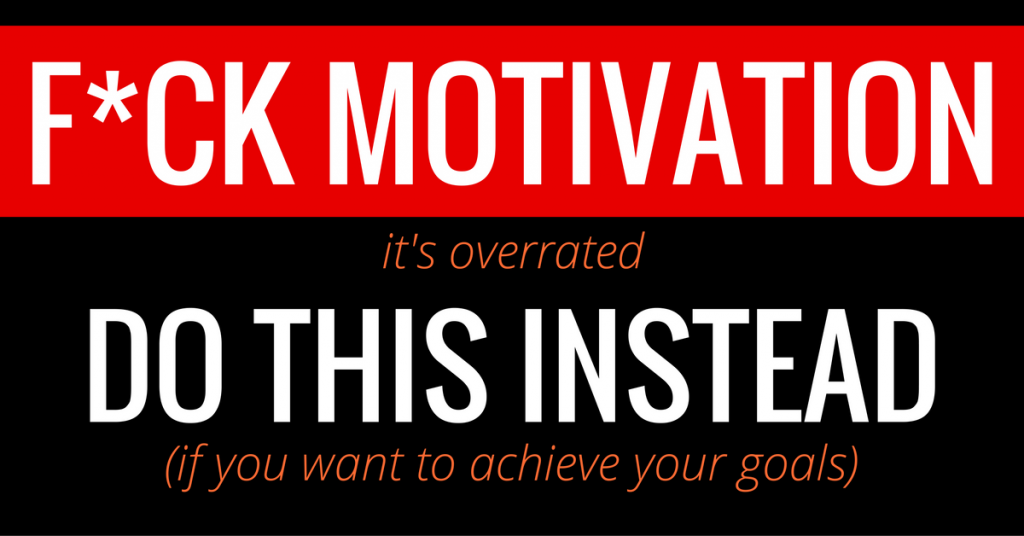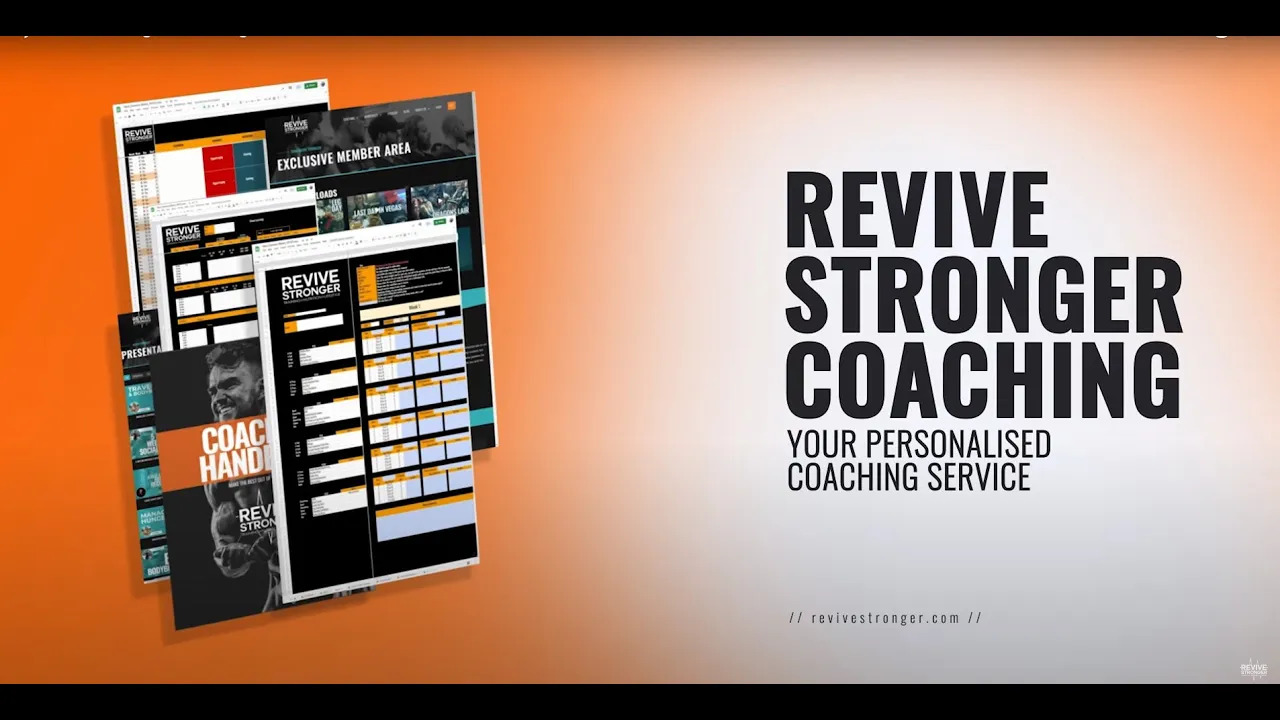
Revive Stronger
F*ck Motivation, Do This Instead

It’s the New Year and there is lots of discussion about making resolutions.
Motivation is often cited as crucial to achieving goals.
In this article Emma Green argues that it’s not only unnecessary to be motivated to achieve your goals but also efforts to boost motivation are largely a waste of time. Emma will provide the steps you can take to achieve your goals that don’t rely on motivation, and are much better.
Table of Contents
Defining motivation
To start it is important to define what is meant by motivation.
Motivation literally means to be moved to do something.
A person who feels no impetus to act is characterised as unmotivated, whereas someone who is energised to act is considered motivated. People have both different amounts of motivation but also different kinds of motivation [1].
Types of motivation
1.] Intrinsic motivation
Intrinsic motivation is defined as the doing of an activity for satisfaction rather than for a particular outcome. For example, going to the gym because you love the activity of lifting weights.
Few people do this, usually it is because of wanting to achieve a particular goal, such as fat loss, muscle gain or increased strength. This is a big mistake because a person is unlikely to continue doing something if they don’t enjoy it. For example, if you hate running, there’s not much chance of you jumping on the treadmill, even if it helps towards your goal of fat loss. In such instances, it is better to make an adjustment that makes the process more enjoyable, such as switching to using a cross trainer or a bike for cardio exercise.
2.] Extrinsic motivation
Extrinsic motivation is defined as performing an activity in order to obtain a particular outcome. For example, eating in a caloric deficit in order to achieve a goal of fat loss. As anyone who has dieted will know, it’s not much fun (being hungry sucks) but it is done to order to lose fat, which is the end goal. Most things we do are performed as a result of extrinsic motivation as we tend to be goal-oriented in our behaviours.
It is important to remember that any type of motivation is short term. Motivation has sometimes been compared to caffeine, it gives a short-term boost but doesn’t last.
Why motivation is unnecessary
Research has shown that little of what we do can be put down to motivation. What this means is that most behaviour cannot be attributed to the amount and type of motivation we have. This is down to the ‘intention-behaviour gap’ [2] which is when people develop an intention to change their behaviour but do not take any action.
–> All words & no action
This happens in many individuals who seek motivation before taking action, such as watching a YouTube video or looking at pictures of their favourite bodybuilder on Instagram. These activities may certainly help to increase the intention to go to the gym or make dietary changes but won’t necessarily make it any more likely that the person will actually carry out the behaviour.
It also won’t help with helping them stay consistent with their behaviour. One workout won’t get someone jacked and one meal won’t get someone lean. It’s consistency over time that really matters. Time spent trying to boost motivation is therefore misguided and takes away from time that could be better spent directly working towards your goals, such as meal prep or packing a bag for the gym.
Actions speak louder than words, and consistent actions are what we need to get what we’re after.
What to do instead
Step 1.] Establish you goal
This seems obvious but it is really important.
Before starting to work towards something, you need to be clear on what it is that you want to achieve.
Your goal should be:
- Realistic
- Tangible
- Specific
This is where working with a coach can be really useful because they can help you determine a goal that is appropriate for you.
Coaches can also help you ensure that you aren’t trying to work towards too many goals at once. For example, it’s best not to focus on both building muscle and losing fat at the same time. Yes, it is physiologically possible for both of these to occur simultaneously but it is highly unlikely. Prioritising one goal will allow you to make much better progress as it ensures that you aren’t spinning your wheels for months on end.
Step 2.] Know your why
Before starting to work towards a goal of fat loss/ muscle gain/ strength it is important to establish your reasons for wanting to achieve the goal. This ensures that the goal you are working towards is really something you want.
If you can’t determine your why, it’s time to reconsider your goal. Again a coach can be really helpful in helping you understand what is underlying your reasons for wanting to achieve a certain goal. Coaches can remind you of these reasons when the going starts to get tough, which can help you make that final push towards your goal.
It’s important to remember that ‘big goals need big whys’.
For example, if your goal is to compete in a bodybuilding competition you need to have a really clear idea of why that goal matters to you. The process of getting ready for a bodybuilding competition is expensive, time-consuming as well as physically and emotionally taxing so you need to be really sure of your reasons before getting started with the process. Thinking ‘because I wanna get shredded’ isn’t going to be enough to stop you skipping cardio and eating more oats when you’re starving and have no energy.
Step 3.] Make a plan
Once you have clearly established your goal and your reasons for wanting to achieve it, it is really important to make a plan of action. This involves detailing all the steps you need to take in detail.
For example, how many calories you will aim to eat per day, how many times you will go to the gym and what your workouts will entail. If you have a coach, they will take care of this aspect for you, although you will need to work closely with them to ensure that the plan is feasible for you.
Step 4.] Make it habitual
As mentioned in the habits article, making behaviours habitual means that there is no need to rely on either willpower or motivation. Establishing habits that are conducive to achieving a goal will help to ensure that behaviour stays consistent and that you are edging closer to the goal over time.
It’s important to remember that some habits may help us to achieve a particular goal but are not necessary or desirable when working towards other goals. For example, preparing, weighing and cooking all of your food yourself may be essential in the latter stages of a bodybuilding contest prep but it isn’t necessary when in the off-season or when focusing on general fat loss. It’s therefore essential to stay mindful and ensure that the habits being engaged in are in line with the end goal.
Step 5.] Embrace the suck
Most goals require some amount of dedication and discipline and there are bound to be times that are particularly challenging, both physically and emotionally. At times like these, the solution is not trying to boost motivation but instead sucking it up and doing it anyway.
To give a personal example, I struggle with seeing the number on the scale increase but know that this is necessary to achieve a goal of muscle gain. Trying to increase my motivation in this scenario is pointless, what I need to do is accept that it’s hard and carry on! (As an aside, I will say that buying a wireless scale that sends the data directly to my phone without me having to look at it has been a life-changer!)
I hate to rip off the Nike slogan but the phrase: ‘Just do it!’ is appropriate here.
Step 6.] Stay reflective on the process
This is an overlooked but crucial part of working towards any goal.
It’s really important to remain reflective on the process, ensuring that you are staying consistent, that you are making good progress and that you are still invested in achieving your goal.
A coach can be really helpful in providing accountability, which can help with consistency. In addition, a coach can ensure that changes made to the plan are necessary and appropriate. For example, adjusting calories slightly downwards and/or increasing cardio when you have hit a fat loss plateau.
Equally, it is important to stay mindful on the environmental factors which may impact upon your ability to work towards your goal. For example, if you are going through a particularly stressful period at work, it may mean that gym visits are more difficult and that preparing food in advance is a struggle. In times like these, it might be a good time to take a diet break and put fat loss on the back-burner for a while.
You can always pick up your goal again later when things are more settled.
Step 7.] Action creates motivation
As has been established in this article, motivation is unnecessary when trying to work towards achieving a goal. Feeling motivated, however, is a nice bonus.
The best way to increase motivation is to take action.
Making visible progress towards our goals is inherently motivating.
So what are you waiting for?
What Next?
I’ve got a task for you, write down your goals for next year, be specific, make them measurable and have a think about how you might achieve them, sketch out a timeline and make it realistic.
If you want to contact Emma you can email her on: [email protected]
If you’re interested in coaching click here.
One more thing…
Do you have a friend who would love the above? Share this article with them and let me know what they think.
[bctt tweet=”F*ck Motivation, Do This Instead” username=”revivestronger”]
References
[1] Ryan, R. M., & Deci, E. L. (2000). Intrinsic and extrinsic motivations: Classic definitions and new directions. Contemporary educational psychology, 25(1), 54-67.
[2] Sniehotta, F. F., Scholz, U., & Schwarzer, R. (2005). Bridging the intention–behaviour gap: Planning, self-efficacy, and action control in the adoption and maintenance of physical exercise. Psychology & Health, 20(2), 143-160.
We are a personal coaching service that helps you achieve your goals. We want you to become the best version of yourself.






